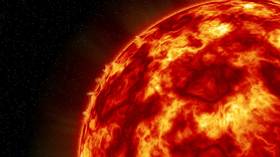Kína kveikir á kjarnorkuknúinni sól, tíu sinnum heitari en sjálf sólin.
China turns on nuclear-powered ‘artificial sun’, TEN TIMES hotter than the real thing
4 Dec, 2020 14:47

Made to replicate the natural reactions that occur in the sun using hydrogen and deuterium gases as fuels, the HL-2M Tokamak reactor is China's largest and most advanced nuclear fusion experimental research device.
It is located in southwestern Sichuan province and was completed late last year. The reactor is often called an "artificial sun" due to the enormous heat and power it produces.
The HL-2M Tokamak uses a powerful magnetic field to fuse hot plasma and can reach temperatures of over 150 million degrees Celsius, approximately ten times hotter than the core of the Sun.
“The development of nuclear fusion energy is not only a way to solve China’s strategic energy needs, but also has great significance for the future sustainable development of China's energy and national economy,” the People’s Daily reported.
The project is part of China’s involvement with the International Thermonuclear Experimental Reactor (ITER), based in France.
The ITER is the world’s largest nuclear fusion project with a price tag of about €20 billion ($24 billion). It involves 35 countries and is expected to be completed in 2025.
Chinese scientists have been working on developing smaller versions of the nuclear samruni reactor, including the HL-2M Tokamak, since 2006.
Fusion is considered the Holy Grail of energy and is what powers the Sun, but achieving fusion is both extremely difficult and prohibitively expensive.
By harnessing the power produced through nuclear fusion it is possible to tap into almost limitless clean energy. Researchers around the world have been trying to attain that goal for decades. The main issue has been finding an affordable way to contain piping hot plasma in one space and keeping it stable enough for fusion to occur.







Athugasemdir
Skilar tćkiđ meiri orku af sér en ţarf til ađ knýja ţađ? Ţví annars er ţetta ekki orkuframleiđsla heldur eyđsla (sem á ţó e.t.v. rétt á sér í tilraunaskyni).
Guđmundur Ásgeirsson, 23.7.2021 kl. 21:56
https://indianexpress.com/article/explained/explained-what-is-chinas-artificial-sun-experimental-fusion-reactor-that-has-set-a-new-record-7341397/
Experimental Advanced Superconducting Tokamak (EAST) frá hina, sem líkir eftir orkuöflunarferli sólarinnar, setti nýtt met eftir ađ ţađ hljóp í 216 milljón gráđur Fahrenheit (120 milljón gráđur á Celsíus) í 101 sekúndu samkvćmt ríkisfjölmiđli. Í 20 sekúndur til viđbótar náđi „gervisólin“ einnig hámarkshita sem var 288 milljónir gráđur á Fahrenheit (160 milljónir gráđur á Celsíus), sem er yfir tífalt heitara en sólin.
China’s Experimental Advanced Superconducting Tokamak (EAST), which mimics the energy generation process of the sun, set a new record after it ran at 216 million degrees Fahrenheit (120 million degrees Celsius) for 101 seconds, according to state media. For another 20 seconds, the “artificial sun” also achieved a peak temperature of 288 million degrees Fahrenheit (160 million degrees Celsius), which is over ten times hotter than the sun.
Jónas Gunnlaugsson, 23.7.2021 kl. 22:46
Ţetta svarar ekki spurningunni.
Hvađ fór mikil orka inn í tilraunina?
Hvađ kom mikil orka út úr tilrauninni?
Ef ţađ fyrra var stćrra en ţađ síđara er ţetta ekkert nýtt.
Vćri ţađ á hinn veginn hefđi ţađ veriđ stórfrétt á forsíđum allra helstu fjölmiđla sem lausn á helstu vandamálum mannkyns.
Guđmundur Ásgeirsson, 23.7.2021 kl. 23:04
Allt rétt hjá ţér.
Samkvćmt Lin Boquiang, forstöđumanni Kínamiđstöđvar í orkuhagfrćđirannsóknum viđ Xiamen háskóla, mun ţađ taka áratugi ţar til starfandi hvarfakljúfur rís úr tilraunastigi.
According to Lin Boquiang, the director of the China Center for Energy Economics Research at Xiamen University, it will take decades for a working reactor to emerge from its experimental stages.
Egilsstađir, 24.07.2021 Jónas Gunnlaugsson
Jónas Gunnlaugsson, 24.7.2021 kl. 00:10
Bćta viđ athugasemd [Innskráning]
Ekki er lengur hćgt ađ skrifa athugasemdir viđ fćrsluna, ţar sem tímamörk á athugasemdir eru liđin.